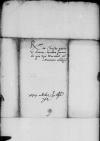List #2349
Stanisław HOZJUSZ (HOSIUS) do Ioannes DANTISCUSKaunas, 1540-10-14
| odebrano Heilsberg (Lidzbark), 1540-10-22 Rękopiśmienne podstawy źródłowe:
Publikacje:
| ||||||
Tekst + aparat krytyczny + komentarz Zwykły tekst Tekst + komentarz Tekst + aparat krytyczny
Reverendissimo in Christo Patri et Domino, domino
Reverendissime Domine, domine colendissime.
Officiosisimam servitutis meae commendationem.
De arca data sunt mandata ad Gedanenses, non dubito, quin ea iam tradita sit domino
De allodio numquam adeo me angebam animi, scio enim rem esse exiguam et quae parum fructus afferat. Mihi vero praebenda istic mea non parvo constat, sed quando ista est absentium conditio, fero aequo animo.
Vestrae Reverendissimae Dominationi ago gratias, quod tanta cura et sollicitudine rationibus meis prospicere conatur. Me vicissim servitorem experietur ad omnia mandata Reverendissimae Dominationis Vestrae exhaurienda semper paratissimum. Exemplum litterarum, quas ad
serenissimam
Cuius me gratiae commendo. Deum precor, ut illam quam diutissime servet incolumem et omni felicitatis genere cumulet.
Ex
Eiusdem Reverendissimae Dominationis Vestrae servitor addictissimus


